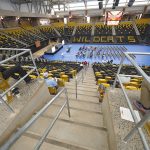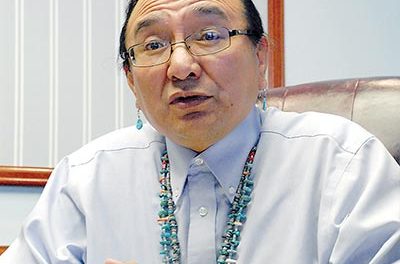
50 Years Ago: In first speech, MacDonald tackles border town issues
Navajo Tribal Chairman Peter MacDonald made his first public speech since being elected to office 50 years ago this week, as the guest speaker at the annual banquet for the McKinley County Chamber of Commerce, and he decided to use it to tackle one of the main issues of the day — the distance that existed between the tribe and the towns that bordered the reservation.
In 1971, Gallup and Farmington were coming under fire from Navajo activists for racism and treating Navajo customers as people who caused problems but had to be appeased because of the money they spent in the city. On more than one occasion during the Nakai years, Chairman Raymond Nakai or a member of the Council would issue a sharp criticism of one or more of the border communities, accusing them of turning many of their people into drunks just to make a few bucks.
On the other side, the tribal government had to suffer harsher language from people living in border towns who complained constantly about the drunks who were always getting in their faces demanding change so they buy more cheap liquor. Marking the first time that a leader of the tribe spoke to a group of city leaders about this and other problems, MacDonald said there had to a “unity of purpose” between the tribe and the border communities if there was even a chance of solving the problems.
“Each group will benefit if we do that,” he said. Over the next few years, MacDonald would make attempts to resolve the problems between the two groups but he found himself handicapped by the efforts of less diplomatic young Navajos to force change upon the border communities.
The diplomatic tack suffered a setback after the death of Larry Casuse, who died in a confrontation with Gallup police after he and a fellow Navajo student at the University of New Mexico kidnapped Gallup’s mayor because he was part owner of a package liquor store located just a mile from the reservation line.
While MacDonald’s speech probably did little to change anyone’s position on the problem of the homeless in Gallup, it did have a major impact on how the business leaders in Gallup felt about MacDonald himself.
This was the first time most had heard MacDonald speak and it was obvious he impressed a lot of people. Bill Richardson, the owner of a trading post and Indian crafts store in Gallup, said, “I think MacDonald’s speech convinced a lot of people in Gallup that the tribe finally had a leader who could carry through with his promises.”
Remember all the talk during the election and afterwards about MacDonald being under investigation by the national Office of Economic Opportunity for his role as executive director for the Navajo branch? It turns out that there was some truth that there was an investigation but its target was ONEO itself and not particularly MacDonald, although his role as a director gave him some responsibility. It turned out that ONEO had problems with findings in an audit for the years 1968 and 1969 and because of this, the agency had told the ONEO board that they would have to deal with the findings before the Navajo program would be refunded again. How serious the problems were had not been made public but board members had been quoted that none were so serious they could not be corrected.
The program was given time to correct the problems but another problem had to be addressed immediately. ONEO had been in violation of the Green amendment since its inception five years before. This amendment to the U.S. Office of Economic Opportunity plan of operations required that at least three of the members of branch boards had to be representative of the people served by the organization. The current board was composed almost entirely from the government and business sectors.
MacDonald decided to deal with his problem immediately and told the current board that their services would no longer be needed. Now, he could have left a couple of board members on the board to ensure continuity, but he decided it was time to overhaul the whole board. What he did was allow each of the five districts on the reservation to choose a board member. The Window Rock and Gallup-McKinley school districts each got a representative as did the BIA and the IHS.
The interesting thing about this is that the tribal government, which had basically controlled the board in the past, had no official representation and MacDonald indicated he liked this because the less government interference the better. These details, once made public, basically ended the rumors that MacDonald faced federal charges for mismanagement of ONEO funds but rumors soon started that MacDonald was under investigation for misuse of federal funds that were going to the tribe.
Years later, after MacDonald began serving a 14-year sentence for his part in the 1989 riot that left two of his supporters dead by gunshots, someone asked me if MacDonald was corrupt from the day he took office. I replied that there was a difference between the MacDonald who was married to his first wife, Ruby, and the one who was married to his current wife, Wanda.
Given the fact that probably every chairman up to that time — and beyond — was guilty to some extent of violating tribal laws prohibiting them from getting campaign contributions from non-Navajos, MacDonald seemed in his first few years in office to be operating above board. He kept his efforts to secure money to asking supporters on the Council to introduce legislation to increase his salary.
And since whenever he did this, he included increases to the amount paid to members of the Council, he seemed to have no problems getting it passed. It was only later, after he married Wanda and his lifestyle changed and he began sending his children to private school, for example, that he seemed to seek ways to find more money outside his tribal income.







 Highway 264,
Highway 264, I-40, WB @ Winslow
I-40, WB @ Winslow